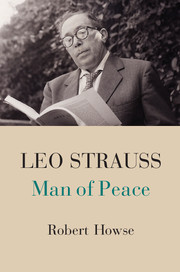Book contents
- Frontmatter
- Dedication
- Contents
- Preface and Acknowledgments
- 1 Introduction
- 2 Warrior Morality and the Fate of Civilization
- 3 Legitimacy and Legality, Thinking and Ruling in the Closed Society and the World State
- 4 Strauss’s Machiavelli
- 5 Thucydides versus Machiavelli
- 6 Justice and Progress
- 7 Conclusion
- Abbreviations
- Index
Preface and Acknowledgments
Published online by Cambridge University Press: 05 September 2014
- Frontmatter
- Dedication
- Contents
- Preface and Acknowledgments
- 1 Introduction
- 2 Warrior Morality and the Fate of Civilization
- 3 Legitimacy and Legality, Thinking and Ruling in the Closed Society and the World State
- 4 Strauss’s Machiavelli
- 5 Thucydides versus Machiavelli
- 6 Justice and Progress
- 7 Conclusion
- Abbreviations
- Index
Summary
My first encounter with the writing of Leo Strauss was in high school, when researching an independent study project on Moses Maimonides. I was instantly gripped by the intensity of Strauss’s writing, the intellectual high drama surrounding the competing claims of reason and revelation, radical questioning yet affirmation of religious experience. As an undergraduate, I studied in Toronto with Allan Bloom and Emil Fackenheim, the former a leading Strauss disciple, the latter influenced by and a friend of Strauss but also critical. The experience with Bloom and his circle eventually led to a lengthy period of alienation from Strauss and all things Straussian. That ended in the 1990s, when David Dyzenhaus, then my colleague at the University of Toronto, encouraged me to think and write about Strauss; David had become intrigued by Strauss through his work on political and legal theory in the Weimar Republic. I confronted for the first time Strauss’s essay on Carl Schmitt and discovered a Strauss who was a trenchant critic, not an apostle, of antiliberalism. David, Peter Berkowitz, Christina Tarnopolsky, and Corine Pelluchon have been invaluable interlocutors and have contributed more than I can say to my understanding of Strauss – and much else. Their intellectual companionship and their friendship have been among the great joys of working on political philosophy.
I have taught Strauss in seminars at the University of Toronto, the University of Michigan, and New York University and have been fortunate to have had wonderfully perceptive students who challenged and deepened my readings. The NYU Law School has proven a wonderful institutional home for this project, which began with my inaugural lecture as Lloyd C. Nelson Professor of Law (some of the ideas in the lecture had previously been presented at the University of Nottingham, during a conference on Leo Strauss in which I had the chance to engage directly with Anne Norton). Two of my colleagues, Stephen Holmes and Moshe Halbertal, have written on Strauss from different and indeed in some ways opposite perspectives to my own; nevertheless, they have always been encouraging and open to giving a respectful ear to my very different point of view.
- Type
- Chapter
- Information
- Leo StraussMan of Peace, pp. ix - xiiPublisher: Cambridge University PressPrint publication year: 2014



